#top 10 story ideas i had before watching barry hbo
Explore tagged Tumblr posts
Text

wormheart
#rio art#previiusly named wormdirt . but i felt like that name was rlly mean and he didnt deserve it#wormheart deputy of leechclan ❤️ hes rlly sweet he was abandoned as a kit by sheepspots his deadbeat dad#but unknowingly rescued the same day by tundrastar who raised him as her own#and promoted him to deputy bc hes so loving and trusting and gullible and manipulable#top 10 story ideas i had before watching barry hbo
3 notes
·
View notes
Text
While trying to come up with a list of favorite/best shows seen in 2023, I realized that this year there hasn't been anything that truly impressed me. Some of them were good, others mediocre and some shows that I started watching and then abandoned for whatever reason. Apart from the last season of Succession, nothing felt exciting enough that would make me impatient for the next episode. I couldn't even gather 10 shows for this list, but anyway, here it goes.
1. Succession
I do think that the last season wasn't as cohesive as the previous ones and sort of lost its direction in the second half, but it still was one of the best tv series of the year. If not for the entire season, at least for the Connor's Wedding episode, which was a masterclass in acting/directing.
2. Barry
It took me a while to get used to Barry and I wasn't really into it at the beginning, but it turned out that season 3 had one of the most interesting pieces of directing in tv and really got out of its way in terms of experimenting with the medium.
3. Rain Dogs
This is a little show, perhaps not very well known. If not for its plot, I think the acting was top notch, but it's something I usually find in a lot of British series.
4. Bad Sisters
I never thought I could hate Claes Bang's face (I really liked him in The Square), but my god, his character was a complete asshole, the worst of its kind. No wonder those sisters came up with 10+ ideas on how to kill him.
5. Jury Duty
I'm always down for a mockumentary and this one was a bit particular, as the main character wasn't aware of what was going on. But I think the project worked and it landed the reveal well. James Marsden was my favorite here.
6. Minx
I've mentioned Minx here before. I'm happy it was picked up by another network after HBO cancelled it. It may not have a big audience, but there's barely any promotion for it. Which is absurd because it's such a fun show about combining feminism with 70s erotica for women in a way that only that decade could have done.
7. Winning Time
Another show barely promoted and also cancelled by HBO after two seasons. I'm not really into sports movies/tv series, but when I'm hooked and the story is interesting enough, I'm all in. I didn't pay any attention to The Lakers before, but its fictional story set in the 80s? Bring it on.
8. Swarm
This is a must see for anyone who is part of a fandom. Yes, it's fiction and it shows a version of what extremism leads to, but I do think it points a mirror to today's understanding of what it means to be a fan. Of taking a really toxic mindset from the online world and applying it in real life. There's a lot of food for thought there.
#m thoughts#top tv series 2023#swarm#succession#winning time#minx#bad sisters#barry#rain dogs#jury duty
4 notes
·
View notes
Text
TV I Liked In 2019
Every year I reflect on the pop culture I enjoyed and put it in some sort of order.
The era of “peak TV” has never been more apparent to me than the past year. I am very aware of the many shows I have not seen (don’t have Amazon Prime, for example), and yet I expanded my list from a top 10 to top 15 and still had to leave out A LOT of stuff I really liked! These picks include my legitimate favorites, ranging from truly important looks at the criminal justice system to ensemble comedies that I couldn’t wait to return to. In another year I may have been able to include the latest seasons of Barry, Stranger Things, Queer Eye, Bojack Horseman, Glow, or the finale seasons of Legion, A Series of Unfortunate Events, Veep, Silicon Valley and The Deuce, all of which I’d still recommend. But these stood out even more.
14 (tie). Chernobyl (HBO) / The Hot Zone (National Geographic)
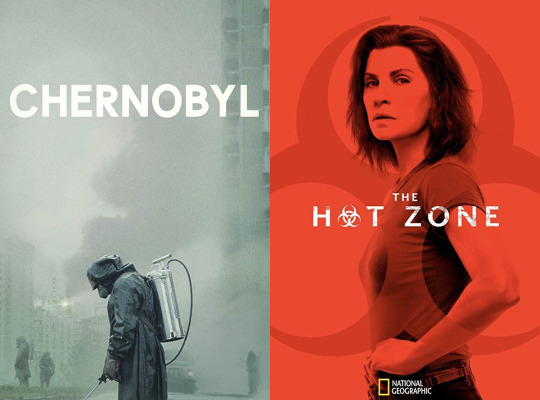
Two limited series focusing on real-life disasters in the 1980s: the meltdown of the Chernobyl nuclear power plant and an Ebola outbreak outside of Washington DC. Chernobyl is an incredibly harrowing account of humanity’s inability to believe things that don’t mesh with their interpretations of reality and the destructive power of lies and cover-ups. The Hot Zone adapts the non-fiction Richard Preston book, a revealing look at pandemics, the power of fear and human resolve. Taken together, they raise interesting questions about governmental gatekeeping, professional competence and personal sacrifice.
13. Mindhunter: Season 2 (Netflix)
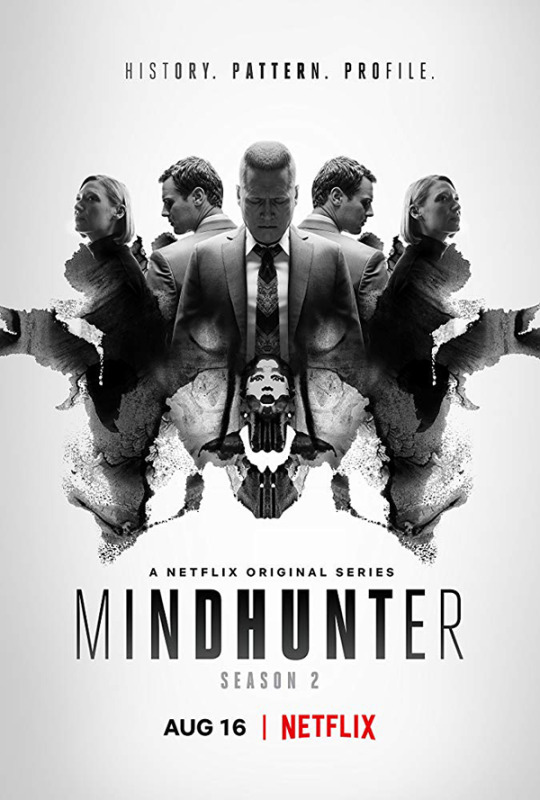
Joe Penhall and David Fincher’s look at the early days of the FBI’s criminal profiling department goes broader and deeper in its second season. There are still chilling interviews with incarcerated serial killers and criminal minds (including Charles Manson this time out), but the season really revolves around the Atlanta child murders. This focus provides a compelling look at who the justice system helps and who it ignores, and the investigative – and bureaucratic – work it takes to put together a case.
10 (tie). A.P. Bio: Season 2 (NBC) / The Last O.G.: Season 2 (TBS) / Schitt’s Creek: Season 5 (Pop)
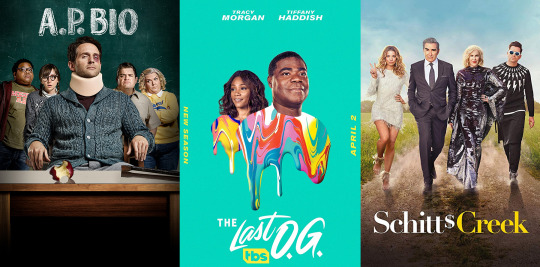
Three great hangout comedies that really came into their own in their most recent seasons. A.P. Bio transcended its first-season preoccupation with revenge and leaned into its fantastic supporting cast – one of the best comedic ensembles around – to become a show I loved spending time with each week. (Thank goodness it’s coming back via NBC’s upcoming “Peacock” service.) The Last O.G. has had a lot on its mind since it began, but its second season covers privilege and the opportunity gap among other issues, ending with a note-perfect homage to Spike Lee’s Do The Right Thing, making it an unexpectedly resonant comedy. Schitt’s Creek is obviously having a moment right now, and Season 5 (the first season I watched as it aired) was perhaps its best yet. While the whole cast is great, as a big fan of Best In Show and A Mighty Wind, I love seeing Eugene Levy and Catherine O’Hara share the screen again.
9. Crashing: Season 3 (HBO)
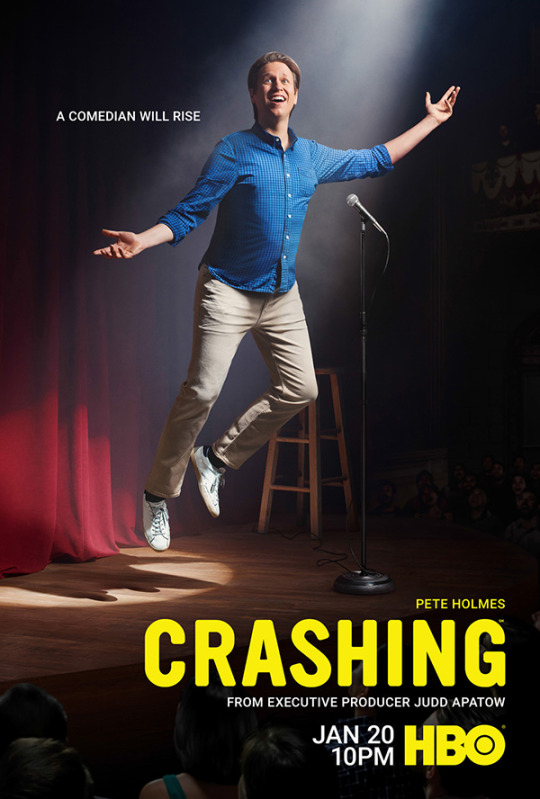
The first two seasons of Pete Holmes’ show made my list in previous years so I’d be remiss not to include the final one, which may be its finest. Pete spends the season making a lot of mistakes – saying yes to things (gigs, relationships) that he probably shouldn’t – and although they provide growth, he doesn’t come across as the “good guy” in how he deals with all of them. This adds additional nuance to the show, questioning its straight white male protagonist’s actions rather than merely rewarding him for following his passions, while still leading to an uplifting and fitting finale.
8. Unbreakable Kimmy Schmidt: Season 4 (Netflix)
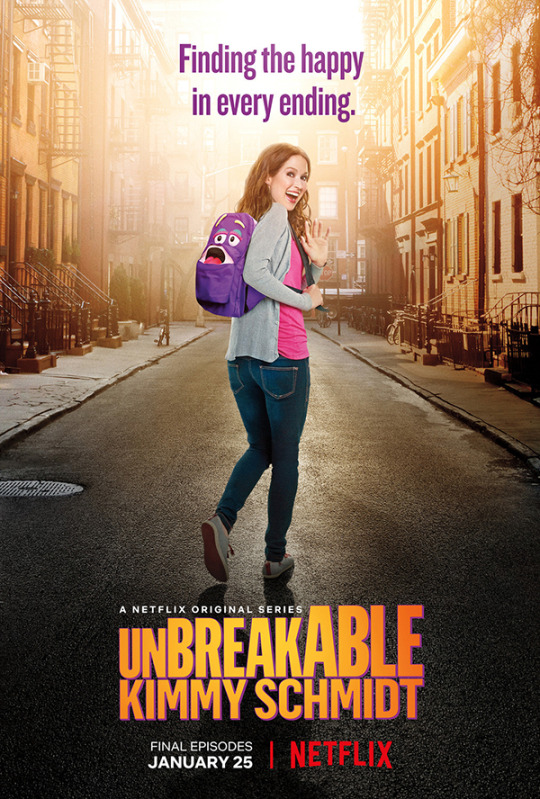
Netflix split the final season of Kimmy Schmidt into two parts, so technically only the final six episodes premiered in 2019. Those alone warrant a spot on the list, as the show concluded by following its idiosyncratic bliss to the end. The final group of episodes includes a (pre-movie) takedown of Cats, a Sliding Doors homage and an unexpectedly moving series finale. If this one fell off your radar a few years ago, it’s worth revisiting and seeing through.
7. What We Do In The Shadows: Season 1 (FX)

Based on the horror-comedy film of the same name, this series follows a different crew of vampires who live together on Staten Island. I was initially skeptical because I love the movie and couldn’t see how a television version could do anything but dilute its charms. On the contrary, the show broadens the universe in hilarious ways by introducing characters like “energy vampire” Colin Robinson and the incredible Vampiric Council (with so many incredible cameos!). The core actors are all wonderful, but the MVP has to be Matt Berry’s louche and libidinous Laszlo whose line readings are simply hysterical.
6. Les Misérables (BBC/PBS)
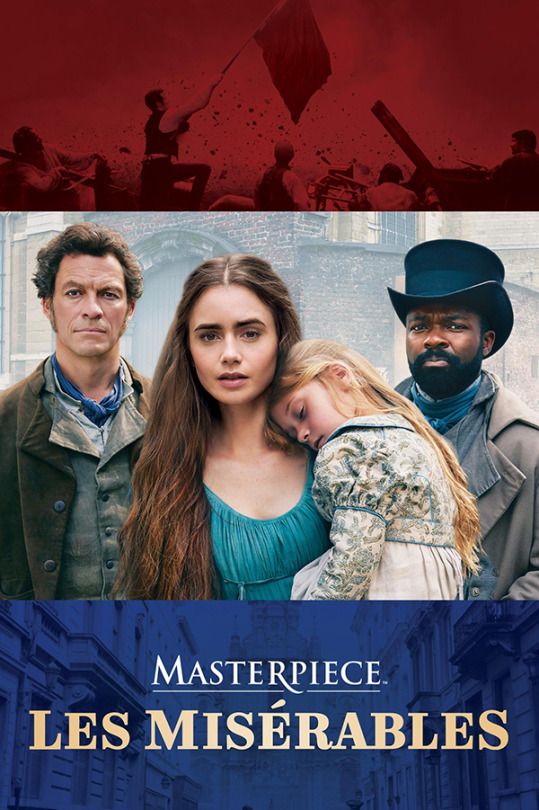
Although it aired in the UK in 2018, the BBC/PBS production of Victor Hugo’s epic didn’t grace American screens until early 2019 so I’m including it here. I am a big fan of the musical adaptation and find it quite successful at cramming so much story into a three-hour runtime, though it obviously has limits to how much of the source material it can explore. This (non-musical) adaptation’s six episodes allow for more of Hugo’s tale of forgiveness versus retribution to live and breathe. The terrific cast includes Dominic West as Jean Valjean and David Oyelowo as Inspector Javert, as well as Lily Collins as Fantine whose backstory is more fully realized here than the format of the stage show allows.
5. Our Planet (Netflix)
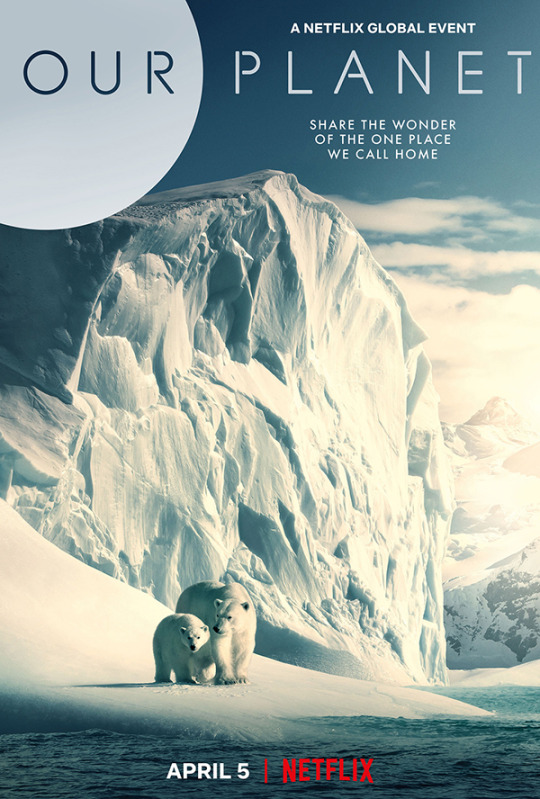
Essentially a sequel to the Planet Earth documentaries, with the same production team and David Attenborough narration, this Netflix series presents another stunning collection of nature footage that showcases the incredible diversity and beauty of animal life on Earth. Each episode includes a haunting reminder of man’s impact on the featured habitats and serves as a rallying cry in the fight against climate change.
4. The Good Place: Seasons 3-4 (NBC)
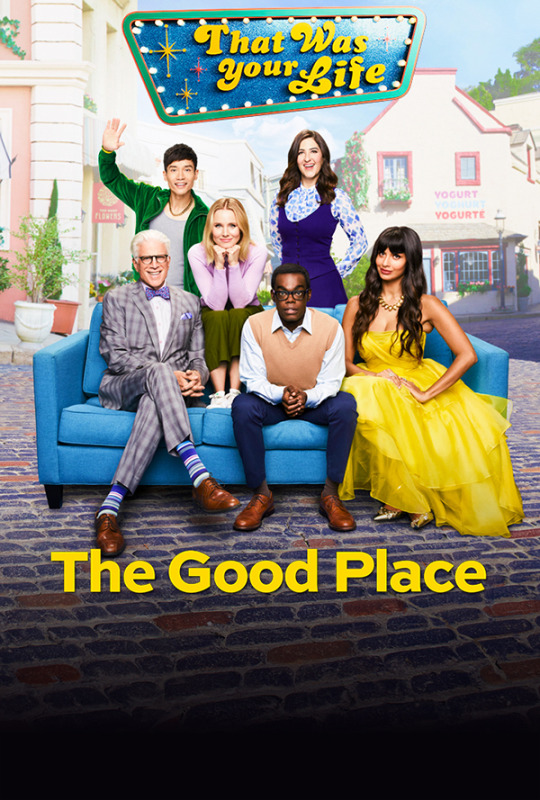
The Good Place has been high on my list since its first season and shows no signs of dropping in quality or esteem as it enters its final stretch of episodes. 2019 encompassed the end of Season 3 (including the hilariously imaginative visit to the Interdimensional Hole of Pancakes) and the beginning of Season 4 (with its crew of new characters and just as many reversals and rug-pulls as you’d expect). The final episode before its winter break was “The Answer,” a touching spotlight on William Matthew Harper’s Chidi, which might have been enough to make this list all on its own. (And given the surprise cameo/quasi-crossover in its first episode of 2020, I wouldn’t be surprised if it shows up here again next year too.)
3. Unbelievable (Netflix)
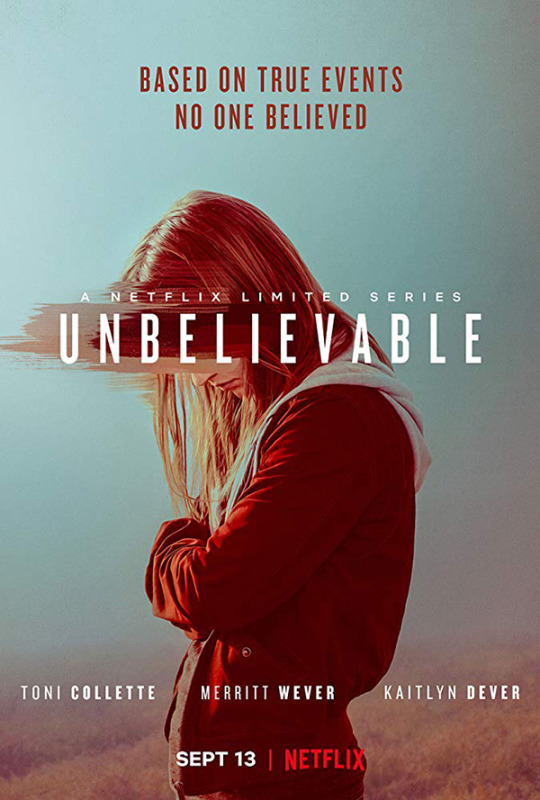
The true story of a serial rape case adapted from journalism by ProPublica, The Marshall Project and This American Life, Unbelievable is one of the most simultaneously heartbreaking and satisfying procedurals I have ever seen. As crushing as it is to watch the initial investigation completely mishandled and devolve to gaslighting, it is powerful and inspiring to watch compassionate public servants and actual good detective work be carried out as the series progresses. Kaitlyn Dever, Merritt Wever and Toni Collette are uniformly excellent here (as they also were in their respective film roles in Booksmart, Marriage Story and Knives Out this year).
2. Watchmen (HBO)
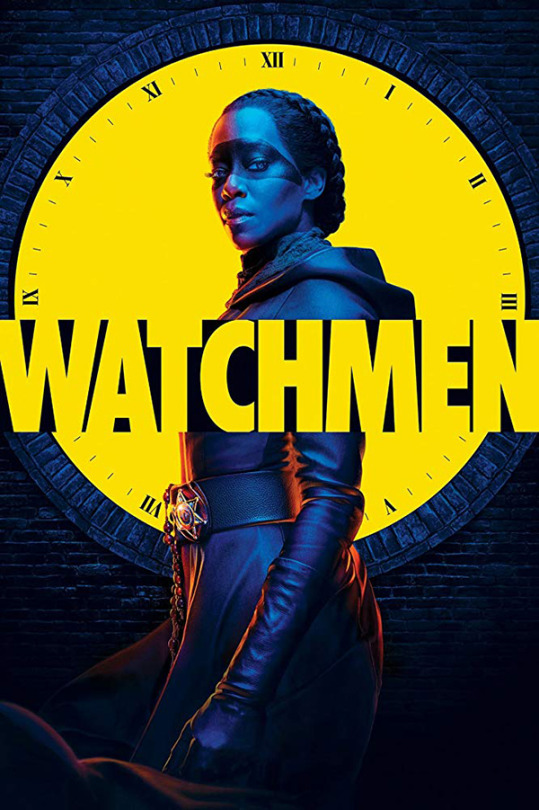
Showrunner Damon Lindelof (LOST, The Leftovers) takes some incredibly bold swings in his limited-run sequel to the groundbreaking 80s graphic novel that deconstructed the ideas of vigilantism and superheroics. Picking up in the same alternate reality as that story but in present day, the main action is shifted to Tulsa, Oklahoma, and the central theme is race relations. It could have gone way off the rails in a million different ways, but I found it to be incredibly successful. Each episode is a captivating work of art and it somehow seems to top itself with each subsequent installment. While I appreciate the book, I don’t love it; this series takes that source material seriously and, to me, completely transcends it.
1. When They See Us (Netflix)
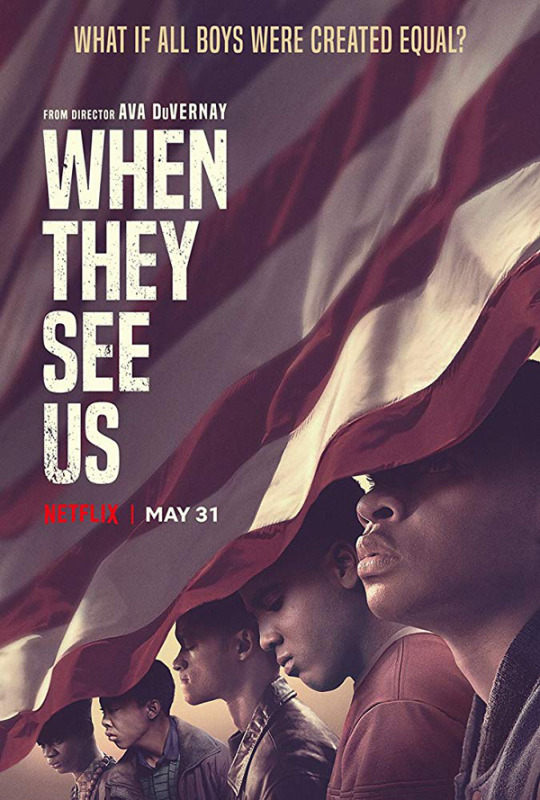
As compelling as it is devastating, this miniseries from Ava DuVernay (who directed and co-wrote all 4 parts) dramatizes the lives of the wrongly convicted children the media dubbed “the Central Park Five.” Even with some familiarity of the story from watching Ken Burns’ documentary years ago, I was utterly gutted by the depiction of the injustices and systemic racism that stole these childhoods. Everyone in the cast shines, but Jharrel Jerome’s portrayal of Korey Wise (the only one of the group played by the same actor as a child and adult – and so convincingly) is truly phenomenal. Not a comfortable watch but an essential one.
Bonus! Musical Comedy Specials:
The Unauthorized Bash Bros. Experience (Netflix) – This “visual poem” from the Lonely Island presents “an album of raps” recorded by Jose Canseco (Andy Samberg) and Mark McGwire (Akiva Schaffer) at their steroid-fueled 80s peak with the Oakland A’s. Your likely enjoyment is probably about equal to your reaction to that description. The songs are great, catchy and hysterical on their own, but the videos take it to another level, parodying everything from 80s infomercials to Enya to Beyonce’s Lemonade. There is no 30 minutes of TV I rewatched more in 2019.
John Mulaney and the Sack Lunch Bunch (Netflix) – Debuting on Christmas Eve, this children’s television homage/parody snuck in just under the wire. The words of the day could be fear and mortality, as the group of kids Mulaney interacts with reveal their personal phobias and several skits revolve around existential angst. By the end of the first musical number I was sold, by the time David Byrne showed up I was committed, and by “Mr. Music’s” madcap finale I wished it could last forever.
6 notes
·
View notes
Text
Best of 2018 in TV
Another year passed and again I watched a lot of good quality tv. I think that although again it was very hard to choose my top 10 this year was a little bit less intense than previous. Still I had to do a short list of places 20-11 because I couldn’t resist not to mention a few more productions. That said remember I’m not a critic. I watch thinks I like not because I have to and this list is totally subjective though I tried to be fair. I watched over 50 series from 2018 and that’s the results:
20-11 (in random order)
The Affair (season 4), Atlanta (season 2), Homecoming, ACS: The Assassination of Gianni Versace, Killing Eve, One Day at the Time (season 2), Lemony Snicket's A Series of Unfortunate Events, Maniac (season 2), Legion (season 2), AHS: Apocalypse.
10. Anne with and E (season 2)
I never was a huge fan of the book as a kid but I read it as mandatory lecture in primary school. But I am a huge fan of this series. Beautiful placement of the plot plus very talented young cast with leading Amybeth. The best part of the story for me always was the dynamics of Anna's relationship with her adopted parents.
9. Patrick Melrose
What an absolutely outstanding trio of actors: Benedict Cumberbatch, Hugo Weaving and Jennifer Jason Leigh. Plus another young talent this year Seabstian Maltz who as a young Patrick is giving one of the most dramatic performence of the year. Creators did justice to the novel.
8. The Deuce (season 2)
This was one of the most enjoyable series this year. I love the period it shows and since the first season I started to develop a sympathy for all those characters especially for Candy. Too bad the series seems to be forgotten this year by critics. In my opion it came back in a lot better shape than last year. It’s funnier, it’s faster and the whole fuss around making porno adaptation of Red Riding Hood is just captivating.
7. Sharp Objects
Another great limited series and another proof of my love to the craftsmanship of brilliant Jean-Marc Vallée. The story from book was kinda predictable and tacky. But thanks to the director who is an expert of showing emotions and dilemmas from the past plus the cast of three great actresses made it into phenomenal work. I am really looking forward to see more projects from cooperation of Mr. Vallee and HBO because so far it brings only true treasures.
6. Barry
I was always a fan of Bill Harder on SNL and his (usually) small roles in comedies. So then I found out that he’s making his own show I kept my fingers crossed for the success. And the results are better than expected. Barry is a great combination of drama and comedy. It sound like things we see lately very often but Barry is the best mix of two this year (not to mention animated series). Why? Because drama is real (he’s a seriall killer with many very hard moral choices to make) and the comedy provided (mostly) by Henry Winkler is just a poor gold. Well done.
5. The Haunting of Hill House
I’m not a big horror enthusiast but I do have a soft spot for those stories in classical form. And what’s more classic than beautiful, old, and huge haunted house. I fell in love with this series and it’s so much better than the previous movies. This one is actually very far from the original story written by Shirley Jackson but it capture the atmosphere the best. Separation of episode focusing on different from five siblings was a great idea. From non-believer to the most affected of the kids the story became more and more intense and scary. I honestly was scared almost the whole time. Still I tried to play with creators and watch for all the hidden ghosts in the background. The secret of Bent Neck Lady was haunting me for a while and even after finishing the series it all stayed with me in my mind. This was my favorite new series of the year. I’d love to see it again in other form, maybe as anthology like AHS. With this cast yes please!
4. GLOW (season 2)
It’s so nice today that we can get such a smahing tv show this such a huge female cast. I love this series and those Gorgeous Ladies Of Wrestling since season 1. I always enjoy it when show or movie takes me to another peroid of time and GLOW blend us into into that reality of 80 like nothing else. We had so many exctiting things this season with Debbie becoming single mother after divorce, Sam Silvia trying himself as a father and the whole team becoiming more and more like a crazy family (recording of intro in the mall was amazing). In real life I’m not really intrested in wrestling (like at all) and though it probably differs a lot than reality I loved those duels bethween characters. Episode Mother of All Matches is one of the best in 2018.
3. BoJack Horseman (season 5)
Oh how I love this show and this character. And before anyone judge me I don’t love BoJack for being a walking disaster and misery. I love this character and many other on the show for the incredibly smart writing. He is a alcoholic, narcissus and washed-out tv star and that who he is. Just like Priness Caroline is an ambitious woman who will give up many things for career even if she know it won’t give her happines in the end. But that’s the greatest thing about this show and creators that they won’t change those characters and put them in unexpected positions just to get the wow factor from the viewers. They still find a way to present those persons in fresh and captivating way but making it “in” the nature of the character. And that’s the fift season so congrats! And still we can count on them to give us some real gems like episode Free Churro which is a masterpiece of writing. The thing is this season of BoJack doesn’t stand out in specific way from other but it gives us the thing it always did and never disappoints - crazy rollercoaster ride.
2. Mozart in the Jungle (season 4)
When I said at the beginning that this list is totally subjective I meant it inter alia because of this series. Mozart IS my favorite tv series. I don’t know if the best but it always gave me the most joy when watching it adn that’s a pretty good determinant. Unfortunately I will have to start saying it WAS my favorite because Amazon cancelled series after this season. I’m still mad and disappointed because GoT is about to end so all platforms grab the money to invest in “next huge thing” (in case of Amazon it’s new Lord of the Ring..yeah we need it). But don’t get me wrong. I didn’t put Mozart this high because I’m mad and or to mark someone’s mistake. I just really loved this season. Placing the plot in Japan was bull’s-eye move. Rodrigo De Souza (favorite tv character next to Leslie Knope) as a boyfriend of Hailey was hilarious, a much as observing her way to become succesfull and independent artist. The scene when she debuts as conductor with piece “Hi” is maybe my favorite moment in whole season. Even stronger is her performence at the finale. Although I rooted for Hailey and Rodrigo as a couple I’m glad that creators didn’t go into cliche with their relationship. Another strong scene is the on at traditional tea ceremony. Of course as always the whole season was very firm from the music side (this series helped me to discover a little piece of classical music and I’m grateful for that). I will really miss this series. I think it could easily do another season especially now when creators decided to end this season in such an interesting place. Too bad...
1. The Marvelous Mrs. Maisel (season 2)
There’s nothing to explain... but I will ;) I compared all the series with each other and in my opinion there was nothing better that Mrs. Maisel this year. I enjoyed it last year but I didn’t even expected how much delight will it be to have it back. Visually it is the most beautiful thing in tv right now. And the writing as always is case of Amy Sherman-Palladino is just excellent. Those characters are so fast and wit it’s just a pleasure to observe them interact and discuss with much to many words and refrences than any normal person would use. And those actors really take it like a champs. All episodes in Paris was nice but it was nothing compre to Catskill where it felt like watching dirty dancing but with much better and more interesting story. I love the way Palladino direct her characters. How they develop especially Midge, her friendship with Susie and her realisation that stand-up comedy is not only the thing she want to do but it is something she will do for the rest of her life. Every time she stands in front of audience, camera or father himself she proves to be nailer and we as audience live for those moments! I really enjoyed see her parents in Paris as we could discover totally different side of them both and also new romance of Midge. But my favorite sequence of the season was Midge watching Lenny Bruce (Luke Kirby is so on point with this role) in last episode and realising it all (inconspicuous scene but made me waste a few tears). At the end I will add that I love the attitude towards the children presented in this series...irrational like many other things.
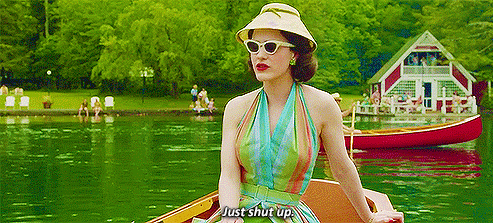
*******
Suming up in my list dominant are HBO and Netflix productions but in the end two first places go to Amazon.
Comapring with previous year there is no sign of Legion in top 10. Well season 2 was good, sometimes even great but not enough to get into the top. Beside there’s less new series on the list (seven in 2017, four this year) but we had some amazing comebacks.
I don’t have huge disappointments this year, maybe just a few. 1) Romanoffs were boring as hell and I really counted on Weiner. 2) Cancelling of many good series like Mozart in the Jungle or Daredevil. 3) Riverdale became so absurd that it beats and law of logic. I mean why it gotta be so intense?
#top10#2018#year summary#tv series#hbo#netflix#Amazon#marvelous mrs maisel#mozart in the jungle#Bojack Horseman#glow#the haunting of hill house#barry#sharp objects#the deuce#patrick melrose#anne with an e#best of 2018
25 notes
·
View notes
Photo

Movies I watched this week / 14
Moonlight - beautiful, heartbreaking and unpretentious. A story about a lonely, abused child who has to come to terms with his blackness and his gayness.
10/10 - Best film of the week.
✴️
The Farewell - A Chinese-American family learns that their grandmother is terminally ill and decide not to tell her, instead scheduling a family gathering before she dies.
Directed by Lulu Wang, who’s the girlfriend of Barry Jenkins, Moonlight director: So they are a couple who both makes outstanding, independent movies.
✴️
So I wanted to check out the other Awkwafina-starring Chinese-American drama, My Big Fat Greed Wedding, AKA Crazy Rich Asians. Unfortunately this materialistic, Wealth-porn decadence was banal and formulaic. Not recommended, in spite of the fact that there are so few big-screen Hollywood romantic comedies featuring all-Asian cast.
✴️
The Descendants: George Clooney is an Hawaiian land baron, whose wife is in a irreversible coma after a boat accident. While dealing with his two rebellious daughters, he discovers that she had an affair with a real estate guy, and was about to divorce him.
Awesome soundtrack of Hawaiian music. Highly recommended. I should re-watch all of Alexander Payne‘s other movies. Supposedly, his next film will be a Minnesota remake Babette's Feast!
✴️
The March of The Penguins is the film that George Clooney and his daughters settle down to watch at the very end of The Descendants.
It may look like a story of survival. But actually, it’s a story about love. (Re-watch).
True Facts about Morgan Freeman’s golden voice by ZeFrank.
✴️
Local Hero, Scottish Magical Realism at its understated best, in what is now being called Gentle Cinema, "pleasant people doing pleasant things". With a very young Peter Capaldi before he became Malcolm Tucker, and with low key soundtrack by Mark Knopfler. (Photo above).
A planet 7345 Happer was named after Burt Lancaster's character in the film.
Haven’t seen it since the 80′s - 9/10!
✴️
Robert Redford is Putting the Band Back Together in The Company You Keep: Julie Christie, Susan Sarandon, Richard Jenkins, Nick Nolte, Chris Cooper, Stanley Tucci, Sam Elliott, Stephen Root, Anna Kendrick and Brendan Gleeson. Solid old-fashioned Redford fair a-la Sneakers / President’s Men / Weather Underground fugitives / 1960s idealism, etc. All Stars!
✴️
More with Stanley Tucci: What Just Happened. A week in the life of Robert de Nero, a hot shot Hollywood producer with problems on the set and with his ex-wife. It’s not 8 1/2 or The Player, but still very enjoyable.
✴️
More from Barry Levinson: 1994 Disclosure. The sexual politics of consent, work harassment & power dynamics are somehow dated, but the story stays intact in parts. The absolute best part is Ennio Morricone‘s subtle score!
✴️
The Taking of Pelham 123 (2009 version) - The perfect hyper Tony Scott thriller.
✴️
The Remains of the Day: Top Anthony Hopkins, Emma Thompson, James Fox, Ivory-Merchant, Kazuo Ishiguro, Ruth Prawer Jhabvala. Riveting from beginning to end.
✴️
Host - the first Covid19 film from July 2020. An original horror story, filmed and set entirely on Zoom, about a seance gone wrong. (Re-watch).
✴️
Another too-long 6-part HBO documentary series Q: Into the Storm, about QAnon, showing once again that you can sell any idea to Americans because basically they are too illiterate to know better.
✴️
Richard Pryor: Live in concert, 1979, the very first full-length, feature movie consisting of only stand-up comedy.
✴️
I read that Winter Kills was supposedly ‘the strangest of all the paranoid ’70s thrillers’, but in spite of its all-star cast (Jeff Bridges, John Huston, Anthony Perkins, Eli Wallach, Toshirō Mifune, Sterling Hayden, Elizabeth Taylor) it was the stupidest story I’ve ever seen - 0/10
- - - - -
(My complete list is here)
1 note
·
View note
Text
How satire mocks, embraces tech world
CLOSE


Jared (Zach Woods), left, Richard (Thomas Middleditch), Gilfoyle (Martin Starr) and Dinesh (Kumail Nanjiani) confront yet another potential tech disaster in HBO’s ‘Silicon Valley.’ (Photo: Eddy Chen, HBO)
When “Silicon Valley” launched in 2014, Pied Piper was just a tiny tech startup.
As one of HBO’s top-rated comedies reaches its final episode Sunday (10:06 EST), the burgeoning company is on the verge of a multibillion-dollar valuation. After creating a game-changing digital network through a combination of genius and accident in last week’s episode, Pied Piper is about to achieve its greatest success, but there’s always the chance for something to go very wrong as it launches the network with partner AT&T.
Much has changed for CEO Richard Hendricks and his Pied Piper colleagues over the past six years, just as it has in the real Silicon Valley home of the tech industry.
Tech, often heralded for its potential to advance society, is now viewed more skeptically by the media and some of the public. Once-lauded titans such as Facebook founder Mark Zuckerberg are subjected to greater criticism on issues ranging from privacy to election interference.

Pied Piper colleagues Monica (Amanda Crew), left, and Richard (Thomas Middleditch) attend a fancy tech gathering on HBO’s ‘Silicon Valley.’ (Photo: Ali Paige Goldstein, HBO)
“There’s been a lot more of a spotlight on (tech) since we started, more coverage of the internal workings of it and the media being more critical, whereas it use to be sort of a lovefest about these wonderful people making the world a better place,” says executive producer Mike Judge, who worked in tech briefly before moving to TV (“King of the Hill”) and film (“Office Space”).
“Silicon Valley” represents the best and the worst of tech, as CEO Richard Hendricks (Thomas Middleditch) struggles to maintain his values and create a safe and efficient internet while being buffeted by competitive pressures, amoral billionaire competitors and the temptation to cut corners that can lead to devastating results.
More streaming: HBO Max: Details on launch date, price and programs, including 23 seasons of ‘South Park’
Judge says he focused Pied Piper on digital compression, a more mundane subject than some glamorous app, because it was grounded in reality, could be applied across the industry and relieved writers of feeling pressure to come up with a novel, billion-dollar idea.
“It’s like when you’re writing a movie about a band that has a hit song. That song would need to be a hit in real life for it to be believable,” he says.

Richard (Thomas Middleditch), left, and Erlich (T.J. Miller) were ‘Silicon Valley’ tech colleagues before Erlich headed off to Tibet. (Photo: John P. Johnson, HBO)
Although the show drills for laughs with satirical exaggeration, executive producers Judge and Alec Berg (“Barry”) tried to accurately depicti the tech world by hiring industry consultants.
“We really committed ourselves to the reality of that business,” Berg says. “It’s also made it much more difficult to write. It’s the first (show) I’ve ever worked on where you could come up with a story idea and just be wrong. It was always, ‘Is this funny? Is this true to the characters?’ But now you’d come up with something you’d love and run it by the tech consultants and they’d go, ‘Nope.'”
Those limitations led to deeper technical discussion and eventually more interesting story ideas, he says. “That was a gift that just kept on giving.”
The real and fictional Valleys can bump into each other. Richard made a heroic if physically inept speech before Congress in October’s Season 6 premiere, just four days after a real-life, decidedly more tense Zuckerberg appearance.
At one point, “our tech consultants were saying we’ve got to do something with cryptocurrency, and we were thinking the public doesn’t really know about that. By the time the (episode) came out, everybody was going crazy over cryptocurrency,” Judge says.
The real Silicon Valley has noticed. Microsoft legend Bill Gates praised the show’s depiction of the tech world in a 2018 blog post and Middleditch says he gets positive feedback from tech workers.
“Either someone will say, ‘That one scene happened to me. It’s like you had a camera there. It feels like a documentary,’ or I’ll get, ‘I tried to watch the episode but I can’t because it makes me relive the trauma (of) a startup,’ which is equally a great compliment,” he says. “Like we got it right so hard we triggered you.”

Facebook CEO Mark Zuckerberg appeared before Congress just a few days before Pied Piper CEO Richard did on the Season 6 premiere of ‘Silicon Valley’ in October. (Photo: Chip Somodevilla/Getty Images)
As perceptions of tech have changed, “Silicon Valley” has evolved, says Middleditch. “The show started out as a satirical commentary on some of the absurdities that surround the industry,” he says. “And then, as mirrored in real life, things got a bit more dire and the show offered a little more depth.”
Despite the tech world’s problems, Middleditch says he believes many in the industry maintain their altruism. And Judge says Richard exemplifies that real-world tension.
Where’s Erlich?How does HBO’s ‘Silicon Valley’ move on without T.J. Miller?
“Is there a responsibility to humanity with what they’re doing, or are they just going to get rich and not care about the consequences?” he says. “That’s been Richard’s journey. It would have been a lot easier if he he didn’t have any morals.”
The writers tried to avoid getting too high-minded, however. “Silicon Valley” is a comedy and Richard and his colleagues can be jerks – as can people in any industry.
“If you understand the emotions behind what the characters do, I think you identify with them. It doesn’t mean they have to be slick, charming, good-looking and happy all the time,” Berg says. “I work on (another) show where the lead character is a guy who kills people. Because he instinctively knows there’s a better way forward and he’s trying to get there, you forgive a lot.”
Say what you will about the shortcomings of the Pied Piper gang. They only talk about killing people.
Autoplay
Show Thumbnails
Show Captions
Last SlideNext Slide
Read or Share this story: https://www.usatoday.com/story/entertainment/tv/2019/12/06/silicon-valley-finale-how-satire-mocks-embraces-tech-world/2627409001/
Sahred From Source link TV and Movies
from WordPress http://bit.ly/362yPeq via IFTTT
0 notes
Text
10 (or 11) Movies Released Last Year That I Really Liked, 2016 Edition
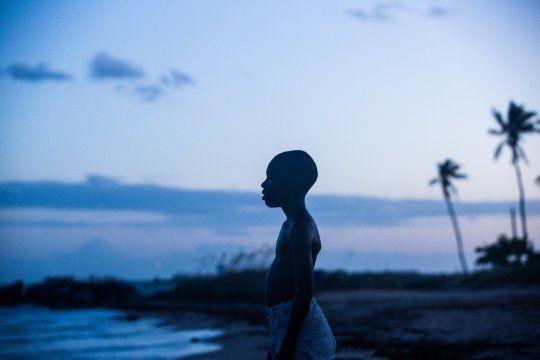
Before I get to my “official” Top 10, one title has been excluded for consideration due to conflict of interest, but would otherwise top my list.
youtube
Darling
Mickey Keating’s 3rd feature (produced by the fabulous Jenn Wexler, a.k.a. my girlfriend) is, of course, my favorite film of the year. I’ve seen it three times in theaters—twice in 2015 on the festival circuit, and again last April on opening night—and still keep finding new, subtle things about it to love.
The story: a young woman is paid to housesit a glorious old building while its eccentric owner is away. Is the house haunted? Is she unhinged? Maybe both? Star Lauren Ashley Carter—rightly recognized as “the Audrey Hepburn of indie horror” by The Austin Chronicle, is in almost every frame of the film and is never short of mesmerizing, whether answering the telephone, putting on make-up or getting her hands dirty by...well, let’s not give away the fun.
The black and white cinematography is gorgeous, the score crawls under your skin and the editing is legit terrifying. Watch with the lights out.
And now back to our official, less personally biased top 10, in order...
youtube
Moonlight
Without question, the most accomplished, most moving film of 2016.
James Joyce once noted, “In the particular is the universal.” Moonlight is atop my list in no small part because it’s so breathtaking in its particular intimacies.
Moonlight is like Boyhood on a budget: it drops us into three important periods in the life of a boy who becomes a teen who becomes a man—at first bullied and confused, increasingly neglected by his crack-addicted mother and influenced by a kind-hearted, drug-dealing surrogate father. We see him harden, over time, under the pressure of a world with no use for softness, and then, perhaps, reconnecting with a lost bit of himself, at long last.
Writing that synopsis, it strikes me how easily such a story could have tipped into cliché and melodrama. Perhaps because writer/director Barry Jenkins and playwright Tarell Alvin McCraney are both from the Liberty City projects themselves. their knowledge—coupled with a great cast, an impeccable soundtrack, a deft use of color and Jenkins’ masterful control of tone—l gives Moonlight specificity, and that makes it universal.
youtube
Jackie
Tone is a theme for the first three films on my 2016 list—four if you count Darling, and you most definitely should. Pablo Larrain’s Jackie puts us inside the experience of First Lady Jackie Kennedy in the aftermath of JFK’s assassination, in a way I never thought I could experience:
Your husband was just murdered; his blood is on your dress. Your life is cracked, and even if you put the pieces back together, nothing will ever be the same. Oh, and he’s the president—was the president—so your country is broken, too. History has its eye on you, so while the crushing weight of grief bears down, try to look good for the cameras. It’s only his legacy at stake.
It seems ludicrous to say that Oscar-nominated Natalie Portman is underrated, but somehow she is—and I adored her in Black Swan. In Jackie, she’s working at another level. Open and wounded when no one but us can see, calculating and brittle and angry before an eager reporter. I am excited to see Portman does next.
Special mention to Mica Levi’s score, her second feature after 2013′s Under the Skin. Can’t wait to hear what she does next, too.
youtube
The Witch
Someone had the terrible idea to market The Witch as “the year’s scariest movie.” It’s not, nor is it trying to be. It is, however, among the most unsettling films of this year or any other. (Again: tone.)
The story: it’s 17th century New England. William, his wife Katherine, and their five children have been kicked out of the settlement being too religious (it seems, or perhaps just too self-righteous) and must find a way to survive on their own on the fringes of the deep, dark wood.
Before you have time to wonder if the titular witch might be metaphoric, she shows up and does something unspeakable to William and Katherine’s newborn son. Things go downhill from there, exacerbated by both outside, malevolent forces and unacknowledged tensions within the family unit.
The Witch looks gorgeous, as well it should. First-time director Robert Eggers made his bones as a production and costume designer, and reportedly built an actual, mostly working 17th century farm for the film. Even the dialogue itself was built out of scraps of things people wrote and said back then. You can feel the authenticity, which makes the family’s isolation feel that much more acute and dangerous.
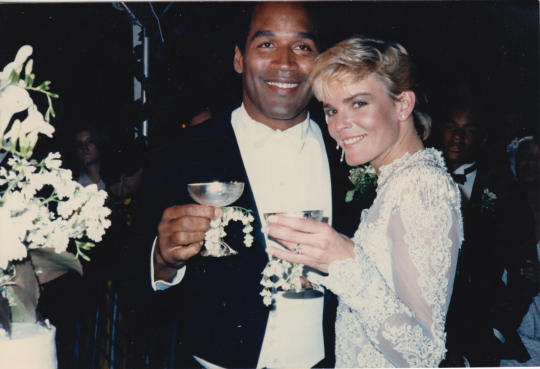
O.J.: Made in America
Bob Dylan never asked “How many minutes does a film have to be, before we can call it TV?” but the answer, my friend, is probably not much more than the 467 minute runtime of Ezra Edelman’s O.J.: Made in America. (For comparison, that’s almost 3 hours longer than a full season of HBO’s Veep.)
It doesn’t help that it was produced by ESPN, or that it aired on that cable network less than a month after it’s Oscar-qualifying theatrical run. And yet...it was my favorite documentary in a year of many great docs (more on that later), so if wants to call itself a movie, I’ll roll with it.
2014 marked the 20th anniversary of the murders. The revived attention around the so-called “trial of the century” led to two great works of art, Edelman’s doc and FX’s American Crime Story: The People vs. O.J. Simpson. (One can only wonder how our present political moment will be filtered through the culture of 2018).
Rather than produce O.J. overload, the two projects complement one another—the dramatic series taking us inside the lives and hearts of key figures on both legal teams, while the doc simultaneously expands the scope and deepens the focus—showing us more about who O.J. was before, during and after, and what America was and still is, especially but not only in Los Angeles, but also in Ferguson, on Staten Island, everywhere. If it takes Edelman 8 hours to set up all details to knock us down with his larger point, well, that’s 8 hours well spent.
Trailer: https://www.youtube.com/watch?v=HrB3rOcrJxg&list
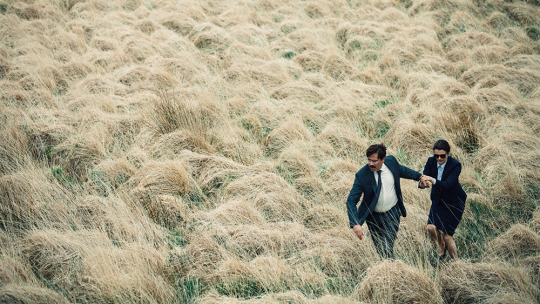
The Lobster
Yorgos Lanthimos’ Dogtooth was one of my favorite movies of 2010. He’s back on the list with a film that’s just as strange but far more accessible.
I love absurdism, deadpan humor, magical realism and dystopian fantasy, but I can’t recall a film that manages the trick of juggling all three at once as The Lobster does—with an honest-to-goodness love story right there in the middle.
I’ll skip the premise—if you don’t know it, watch the trailer.
The cast is great, and Colin Farrell is a revelation, topping my previous Farrell favorite, the criminally under seen In Bruges. Lanthimos packs the film with small details that make the surreal world of The Lobster believable. The first shot packs an entire story of love, betrayal and murder (which is never revisited) into a single, long take. And its final, wrenching moments will stay with me forever.
Film critic Britt Hayes got to the heart of the filmmaker’s uncanny alchemy when she noted “Lanthimos doesn’t heighten reality to an absurd degree; he heightens the absurdity of our existing reality.” Or put another way, he doesn’t add absurdity, he just turns the heat up on reality and our own absurdity bubbles to the surface.
Trailer: https://www.youtube.com/watch?v=LTNZmOJxuAc
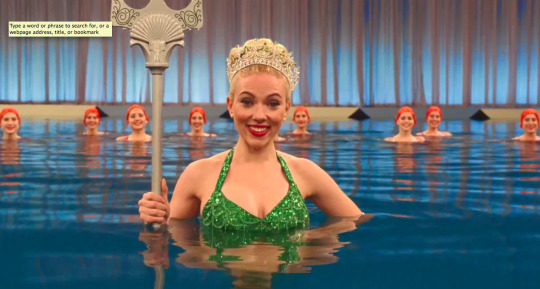
Hail, Caesar!
There’s this other movie that’s sort of a throwback to old Hollywood, with some singing and dancing in it. That movie’s fine, but don’t hold your breath, it didn’t make my list. For my money, the real love letter to Hollywood—and why the movie industry matters—came from the Coen Brothers.
Now, it wouldn’t be a Coens movie if that tender heart weren’t covered under many layers of arch cynicism, stylized reference bordering on “acting” “in” “quotation” “marks” and the occasional silliness. But you don’t have to peel much of it away to see the real love they have for not just the magic of movies but also the joy in so many abandoned film genres that once ruled the box office—be they Gene Kelly musicals, Gene Autry oaters or C.B. DeMille bible epics, to name but a few recreated here.
For me, Hail, Caesar! sits perfectly between the sour cynicism of the Hollywood in Woody Allen’s misanthropic Cafe Society and the false romanticism of the ambition-for-ambition’s sake “dreamers" of La La Land who prize the warmth of the spotlight over any real human affection.
Trailer: https://www.youtube.com/watch?v=1NYpz_j3e38
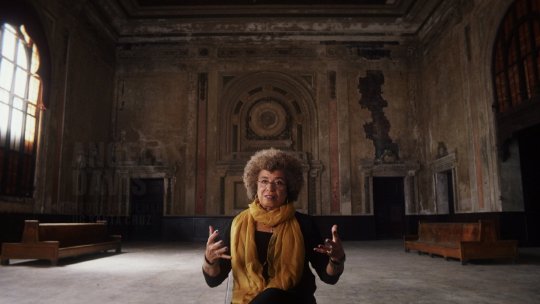
13th
Ava DuVernay’s 13th is a civics lesson for a country in dire need of one. With a controlled but searing ferocity, the documentary lays out the case that the 13th amendment allowed the continuation of a system of oppression and control not all that from slavery: the criminal justice system. If you haven’t read your Constitution lately, here’s a refresher on the 13th, the amendment that ostensibly ended slavery:
“Neither slavery nor involuntary servitude, except as a punishment for crime whereof the party shall have been duly convicted, shall exist within the United States, or any place subject to their jurisdiction.”
This one, terrible clause not just perpetuated slavery under another name but incentivized an expansion of the definition of criminality, in order to profit from the subjugation of mostly brown and black bodies, which has led to an explosion in America’s incarcerated population. In effect, through laws designed to maintain segregation, blackness itself has been criminalized.
With Jim Crow, redlining, lynching (terrorism by another name) and the like, the 13th has led to a more unequal society—and, indirectly, to leaders who lie and stoke racial, as well as religions and ethnic, divisions in order to maintain the ever-growing class divide from which they profit.
This poor summation doesn’t do justice to the full weight of the case DuVernay and her experts make, or how well they make it. 13th should be required viewing by everyone, but most of all by those who hold the power to make and enforce the law.
Trailer: https://www.youtube.com/watch?v=V66F3WU2CKk
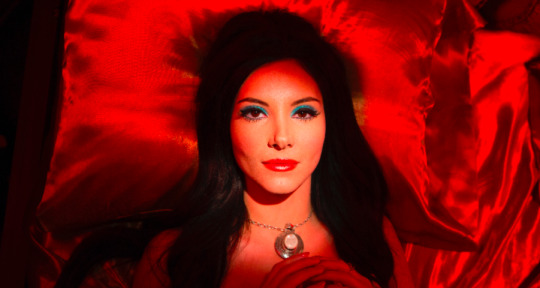
The Love Witch
Let’s start with the obvious: Anna Biller’s The Love Witch is a gorgeous film. Turn the sound off, re-order the scenes at random and you still can’t take your eyes off what looks like a lost Technicolor American Giallo from 1972. Biller not only wrote, edited and directed the film but also handled production design, art direction, set decoration and costuming, almost single-handedly crafting one of the best looking films of 2016.
Beneath that dazzling frosting is a rich, feminist layer cake. Elaine is a witch specializing in sex magic, who believes her path to happiness lies in finding the right man, seducing him and pleasing him in every way. On paper, she’s a patriarchy’s dream come true. But when these lustful men inevitably fall short—as they all must, as patriarchy itself is built on a lie—she gets rid of them, permanently. Poor, unfulfilled Elaine.
The Love Witch is Biller’s own magic trick, casting its spell over us with its color, its throwback ‘70s sexploitation vibe and its razor-sharp message we don’t notice until the blade has slid, quietly, between our ribs and stabbed us in the heart. Metaphorically.
Trailer: https://www.youtube.com/watch?v=bXjDEDYlu7c
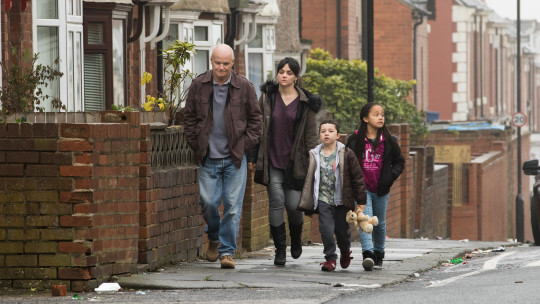
I, Daniel Blake
Daniel Blake has spent a lifetime working with his hands, supporting a modest but pleasant life for himself and his late wife. After a heart attack, his doctors tell him he’s not fit to return to work—yet with a simple questionnaire (and absent any input from his doctors), the government’s welfare bureau deems him too fit to qualify for disability.
He can apply for unemployment benefits, but only if he’s actively seeking work—work which, according to his doctors, he can’t accept. Caught in a catch-22, he must appeal to an unreachable “decision-maker” for relief—provided he can find a way, without income or assistance, to get by while he waits. Then Daniel meets a single mother in stuck in a similar situation and does his best to help her struggling family, even as his own situation grows worse.
Ken Loach’s drama won the Palm D’Or at Cannes but has received not much notice since then, at least outside the UK, perhaps because of the specific criticism of the British welfare bureaucracy at the heart of the story. But you don’t need much imagination to see how things can be as bad or worse for the many Daniel Blakes of this country.
Loach has been making socially conscious films about the struggles of the working and lower classes for longer than I’ve been alive. As with Jenkins and Moonlight, it’s clear Loach knows this world, these people and their struggles, and knows how to tell their particular stories in a simple yet powerful, moving and universal way.
Trailer: https://www.youtube.com/watch?v=f4KbJLpu7yo
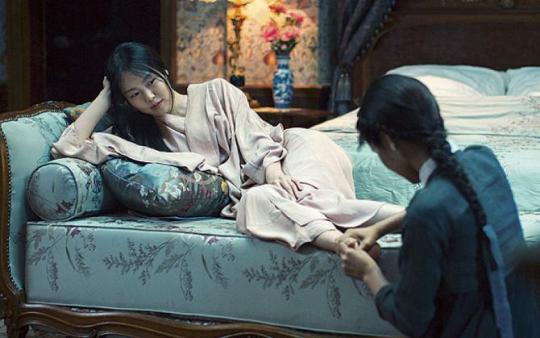
The Handmaiden
Apologies if you’re getting whiplash. I went from a highly stylized Love Witch to a pared-down I, Daniel Blake. Now I’m going to swing back the other way with Park Chan-Wook’s sensual, sensuous The Handmaiden.
As has been the case in years prior, the 10th (really, 11th) and final spot on my list could have gone to a number of worthy films, and almost did—I began writing up another film here before realizing there’s no way I could round out 2016 without giving The Handmaiden its due. (Sorry, Elle!)
The story of The Handmaiden is...too complex to go into here, frankly. There’s a con man and his female accomplice. There’s a rich heiress and her controlling uncle. Some of them are Japanese occupiers; others native Koreans. Oh, ands there’s a library of dirty, dirty books.
Cons are conned, crosses are doubled, no one is quite who they pretend to be and everyone is up to something. In the end, something real is found and, through it, freedom is won.
The Handmaiden is a thriller as elegant as it is perverse. Every change in perspective brings new meaning to all that’s come before. Every twist revealed is a delight. Park Chan-Wook is at the top of his game.
Trailer: https://www.youtube.com/watch?v=Q4Z5jfjxdvQ
Honorable Mentions & More
Wait, don’t get up. There’s more!
First, let’s start with honorable mentions that you already know are great:
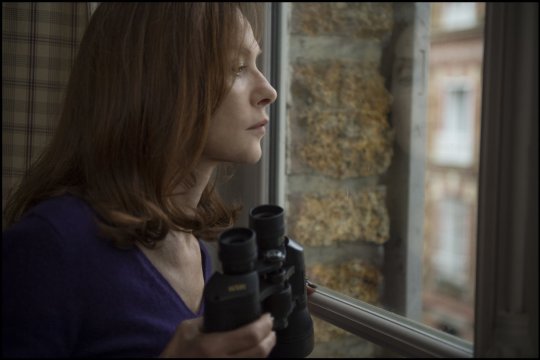
Paul Verhoeven’s psychological thriller Elle, which features Isabelle Huppert in one of my favorite performances of the year, or maybe ever.
Denis Villeneuve’s Arrival, which goes on my list of essential smart science fiction, along with Gattaca, Ex Machina, Primer and Under the Skin, to name a few.
Sing Street, one of the most joyful films of the year. A misfit ‘80s Irish teen starts a band so he can cast the girl he likes in their highly creative music videos. From John Carney, the filmmaker behind the equally charming Once.
Nicolas Winding Refn’s mad look at fashion, envy and unchecked ambition (kind of the anti-La La Land?), The Neon Demon.
Next, films that might have been off your radar but are well worth seeking out:
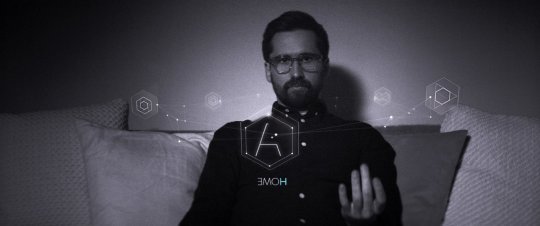
Benjamin Dickinson’s Creative Control, a very-near-future sci-fi film about augmented reality, and the augmented lives we all want to pretend we’re living (at least on Instagram). A must-see for all my friends in media, marketing or technology.
Elizabeth Wood’s directorial debut, White Girl, in which a New York City undergrad moves to Queens, dates her local corner drug dealer and learns first hand the limits of her privilege in both their lives.
Taika Waititi’s The Hunt for the Wilderpeople, a reluctant buddy comedy/coming-of-age film that’s way more fun than it has any right to be.
Todd Solondz’s Weiner-Dog, a dark, dark comedy stringing together four tales of unhappy people, all of whom at one point own the same sad canine. Or, for you hard-core cineastes: Au Hasard Dachshund.
American Honey, Andrea Arnold’s sprawling tale of wayward youth living for the moment across a vast swath of America, high and low.
The animated documentaries Tower, which looks back on America’s first campus mass shooting in a surprisingly moving way, and Nuts!, which is the rare doc with an unreliable narrator, which fits the unreliable (Trump-like) conman at the center of its story.
Julian Rosefeldt’s Manifesto, which I was fortunate enough to experience as a multi-screen installation at the Park Avenue Armory but has been adapted (rather successfully, it seems) as a traditional film. Either way, Cate Blanchett takes on a dozen different guises in a sequence of stunning short films, the text of each comprised of bits of famous manifestos, from Karl Marx’s Communist Manifesto to Jim Jarmusch’s Golden Rules of Filmmaking.
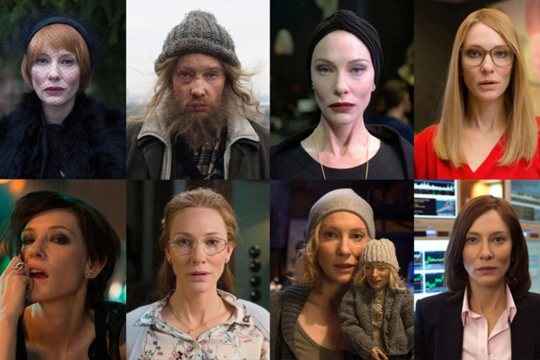
And last, because the horror genre in near and dear to my heart, here’s #4-#10 on my year’s best horror list. (The top 3 being Darling, The Witch and The Love Witch.)
The Invitation
Green Room
Demon
Under the Shadow
Train to Busan
10 Cloverfield Lane
Southbound
Honorable mention: the “Happy Father’s Day” segment of Holidays
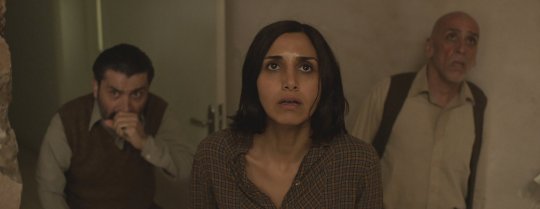
Past years: 2015, 2014, 2013, 2012, 2011, 2010, 2009, 2008
#movies bestof2016#darling#moonlight#jackie#oj made in america#the witch#the love witch#the lobster#hail caesar#13th#i daniel blake#the handmaiden
1 note
·
View note
Text
My 2017 in Pop Culture
Same deal as usual. This is what meant most to me last year in pop culture.
Top Forty Things From 2017

40. The Mummy I liked it. It's definitely got the worked-over vibe that people most object to in these shared-universe experiments, and it goes a little bigger and more action-heavy than I'd probably prefer for a Universal Monster movie. But, I liked the way it fused a modern Tom Cruise narrative with a traditional monster story. I liked the genuine horror movie flourishes throughout. I liked the winks at monster fans in the Prodigium headquarters. I loved Sofia Boutella's Ahmanet. And I loved Russell Crowe's silly/creepy thug Mr. Hyde. This one also got bonus points for The Mummy: Dark Universe Stories, the iPhone game that came out a month after the film. The story plays out a sequel to the movie, but the real nerdy thrill of it was the way it incorporated a bunch of original Universal Monsters characters and ideas, including Lisa Glendon from Werewolf of London and Kharis and Boris Karloff's Ardeth Bay from the original Mummy movies! 39. Baby Driver This was just a delight, a combination of classic crime movie and classic musical with that Edgar Wright energy giving it that extra nitrous burst of excitement. 38. "Every Country Has a Monster" on Mystery Science Theater 3000: The Return I'm one of those fans who loved Mystery Science Theater 3000 when he stumbled across it on cable in the 90s but has a little trouble with the way it gave license to a certain sourness and superiority about older movies among some audiences. Still, I found myself looking forward to the revival with a little trepidation as to whether it would find the right tone (or recapture the lo-fi public access charm of the original). The first twenty minutes or so of the first episode back (focused on the Danish giant monster movie Reptilicus, so they were doing well by me right off the bat) were pretty promising, but this song about giant monsters of myth across the world was where I decided I was on board for this revival. 37. Happy Death Day What a fun time this was! It's got a really charming lead performance and a fun story hook, but it's really the energy and inventiveness that it applies to slasher movie/Groundhog Day story of self-improvement that put it over the top for me. 36. John Wick Chapter 2/Free Fire/Atomic Blonde Hard to pick from among the three of these in terms of which action movie I had the most fun with this year. They've all got something special to recommend them. 35. The Scariest Story Ever: A Mickey Mouse Halloween This doesn't quite scale the heights of last year's Duck the Halls Christmas special, but it was still a funny, thoroughly delightful seasonal treat that I'll probably make a point of watching next October too. 34. My Favorite Thing is Monsters Vol. 1 I checked it out because I'd read it was a comic about a 10-year-old girl who was obsessed with monsters (picturing herself as a little wolfman) who tries to solve the murder of her neighbor. What I got was a moving story about historical injustice and personal revelation told with dazzling illustration. Really, this knocked me out. 33. Gemini/Murder on the Orient Express I think Gemini is actually going to be a 2018 release, but these two mystery films really scratched an itch for me this year. I was a big fan of director Aaron Katz's Cold Weather, a wonderful little mumblecore mystery story, but I wasn't prepared for how much I dug his twisty neo-noir, Gemini. And Murder on the Orient Express was kind of a similarly satisfying experience on the other end of the spectrum: a lavish, big-budget adaptation with a cast stocked with movie stars and exciting up-and-comers. I loved it, and now I'm all about seeing Branagh continue to work on his little proposed Agatha Christie universe. #thirtyBranaghPoirotmovies 32. Okja It's a new Bong Joon-ho film! That means it's got a bunch of thrilling filmmaking, wild performances, tricky tonal shifts, and a beautifully clear-eyed honest empathy. 31. The Get Down Season One, Part Two I was sorry to see this one cancelled after the still thrilling but also melancholy second half came out this year. I really fell in love with these characters, and it was always an exciting experience. And this was just one of the many Netflix shows I really loved this year (including Mindhunter, BoJack Horseman, Lady Dynamite, GLOW, Orange is the New Black, and Unbreakable Kimmy Schmidt). 30. The ending of Split I loved the rest of Split, and I was already onboard the M. Night Shyamalan comeback train from The Visit (after riding like five movies on the “oh no, he’s lost it so bad!” train). But those surprising final moments of Split, while holding the potential for another dive into disastrous hubris, made me straight up gasp out loud in confusion & delight.

29. The Samurai Jack Revival/Finale I enjoyed a lot of the original run of Samurai Jack, but I wasn’t exactly a devoted viewer & hadn’t particularly missed it in its absence. So I checked out the revival largely just to see what the great Genndy Tartakovsky would to with it after spending time on other projects. And wow! It turned out not only to be a truly gorgeous & riveting experience, but it also took the characters & elements of the original & gave them some interesting psychology & moral challenges. 28. Nathan for You’s "Finding Frances" I love Nathan For You, but this year’s season finale, “Finding Frances,” was probably the most interesting thing he’s done with the format. In some ways it’s basically Nathan For You: The Movie, finding a sprawling emotional journey, still filled with nutball comic cul de sacs, that also digs into the “Nathan” character & finds a new place to take him by the end. 27. Lemony Snicket's A Series of Unfortunate Events Season One I figured I’d check out the first season, despite the fact that it would mostly be covering the same material covered in the totally decent Jim Carrey movie, because I was interested to see Barry Sonnenfield finally get a shot at the material & because I wanted to see what they’d do with the later books. But from the first moments with Patrick Warburton’s Serling-esque take on Lemony Snicket (and that infectious theme song) I fell in love with the show. The cast is great, the adaptation work is clever and involving (including an ingenious side story with Will Arnett & Cobie Smulders that seems brilliantly designed to provide different-but-complementary experiences for fans and non-fans), and I stress again how much I loved Warburton. There’s also a wonderful flourish in the season finale that amped my love into adoration. 26. A Cure For Wellness If Gore Verbinski can keep getting people to give him huge budgets to make big, weird genre films about the rot at the center of capitalism and western civilization, I will keep seeing them and (presumably) loving them. 25. Opening sequence of Valerian and the City of a Thousand Planets The rest of the movie is a colorful bit of fun, but the opening sequence where we see, via montage, the establishment and development of the titular city of a thousand planets, is as sublime and moving a movie moment as any I saw this year. Thrillingly optimistic and hopeful, Besson briefly hits on something more than his usual enjoyably daffy nonsense. 24. Final seasons of The Leftovers & Vice Principals Two HBO shows I loved aired their final seasons this year. Both of them had set themselves up with particularly tricky tasks in providing satisfying resolutions without either ruining the mystique of what had come before or pulling their punches in a way that impacted the whole. And they both nailed it. 23. A Ghost Story I wrote about this one for SportsAlcohol.com. I found it bewitching and it stayed with me. 22. Star Trek: Discovery It was a long wait, but this new Star Trek show pretty immediately justified my subscription to yet another streaming service all on its own. I love the characters, I’m engrossed in the storytelling, and I’m challenged by the moral and intellectual ideas it’s exploring. Good Star Trek. (This also may as well be where I mention that I also watched, and pretty much enjoyed, the whole first season of Seth Macfarlane’s generic brand Trek cover, The Orville. Pretty well scratches whatever old school Trek itch Discovery could have left me with.) 21. Wormwood I love most everything of his that I’ve seen, but this is basically in competition with Tabloid for my favorite Errol Morris project.
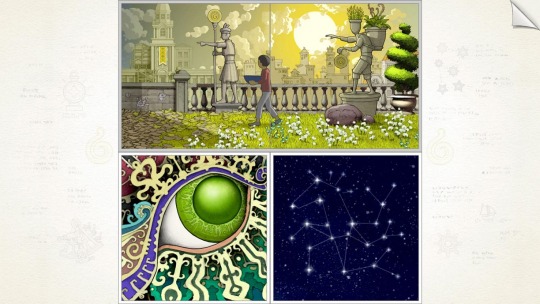
20. Gorogoa Feels almost silly that I found what basically amounts to a puzzle game for my phone so entrancing & even spiritual. But I LOVED this thing. My only complaint is that it wished it kept going and going. 19. DuckTales Wrote about this for SportsAlcohol.com. A testament to how delightful this show is can be found in the fact that I put it in this slot instead of the also hugely enjoyable Milo Murphy’s Law. 18. Marvel Cinematic Universe While this year I definitely cooled on the Marvel television offerings (I still watched and enjoyed the Netflix shows despite some underwhelmed feelings, and I'm still pretty high on Agents of SHIELD, but Inhumans was a total misfire), it was perhaps the best year yet for Marvel Studios's cinematic offerings. I totally loved Guardians of the Galaxy Vol. 2, Spider-Man: Homecoming, and Thor Ragnarok. They each offered something fairly distinct and emotionally engaging (even Ragnarok, despite it's hilariously cheeky tone) and they were all a complete blast. Best Guardians yet, best Spider-man yet, best Thor yet! 17. Lady Bird Between 2016’s Edge of Seventeen and this, guess I’m gonna hope for a wonderful teen girl coming-of-age movie every other year. And thanks to Saoirse Ronan, Laurie Metcalf, and the idiosyncratic empathy of Greta Gerwig, this one was a true highlight of 2017. 16. Get Out The terrific horror-themed sketches on Key & Peele suggested a genuine feel for the genre, so it wasn’t a huge reach to expect Jordan Peele’s directorial debut horror movie to turn out well. But this one still felt like a revelation at the beginning of the year (not to mention a huge event when seen with an audience). 15. Your Name Another wonderful surprise, this one makes some clever and twisty shifts as what starts out as a charming body-switching comedy reveals an emotional core that really swept me away. 14. War for the Planet of the Apes I wrote about this one for SportsAlcohol.com. 13. Blade Runner 2049 I also wrote about this one for SportsAlcohol.com. 12. The Post I wrote about this for SportsAlcohol.com too! 11. Coco Look, I’m generally less excited about Pixar’s sequels than I am about its originals (and I generally really like or love their sequels! but still...), and Coco is a perfect example of why. It’s a great story with a bunch of lovable new characters, beautiful new worlds, and the fun of seeing something new. And as is often the case, it also packs a real emotional wallop. 10. S-Town Speaking of emotional wallops, this podcast miniseries was already shaping up to be an involving look at a fascinating character, but a bombshell dropped in an early episode spins the thing into something deeper and more powerful than anything else I listened to this year.
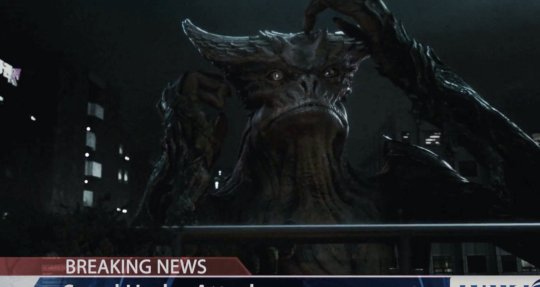
9. Colossal Wrote about this for SportsAlcohol.com. 8. The Marvelous Mrs. Maisel While this show has many things that set it apart from the other Amy Sherman-Palladino shows I love (namely Gilmore Girls & Bunheads), it does share the qualities of being unstoppably effervescent and entertaining while offering hidden depths. We gulped the whole season down in two plane rides and can’t wait for the next batch. 7. Star Wars: The Last Jedi Wrote about the movie on SportsAlcohol.com. It was another good Star Wars year in general, with some excellent Star Wars Rebels episodes, the continuation of the fantastic Marvel comics, and some cool novels (generally I didn't read any bad Star Wars books this year, so that's good; personal highlights were Aftermath: Empire's End and Leia: Princess of Alderaan). But the real highlight was, of course, the movie. It was a joyful, powerful experience opening night (in a way that felt interestingly different from the experience of The Force Awakens), and it’s a movie that has lingered and deepened in my mind as I’ve thought about it. 6. The Shape of Water I run pretty hot and lukewarm on Guillermo del Toro (that is to say, I don’t particularly dislike any of his movies, but while I love some of them, others just don’t connect like I feel they should, despite how much the separate elements might appeal to me). But for every one that I just like okay, he connects with something like this, a gorgeous, perverse fairy tale retelling of the Creature From the Black Lagoon with tributes to Cold War paranoia, classic movie musicals, and a great Michael Shannon performance added to the mix. Just a lovely tribute to the way love can unite the disenfranchised and overlooked. 5. Kong: Skull Island An eye-popping fever dream of a monster mash, this movie assembled a stacked cast of actors I love and surrounded them with some of the most stunning monster movie images I’ve ever seen. A++++infinity 4. Stranger Things 2 What a wonderful surprise the first season of this show was, and what a relief and a joy to get this sequel that is, in most ways, even better. By the final scenes of the finale, I was more in love than ever. 3. The Florida Project I wrote a bit about this for SportsAlcohol.com, so I think it’s enough to say here that this is a very special movie. 2. American Vandal What a wonderful little surprise this was! Like Stranger Things last year, this was something that popped up on Netflix & gave me something I didn’t know I wanted. On one level, it’s just a silly, dirty joke really elaborately told. But on another level, it’s a sneakily moving portrait of the way that expectations and choices made when you’re young can really impact what you become in that transition from teenager to adult.
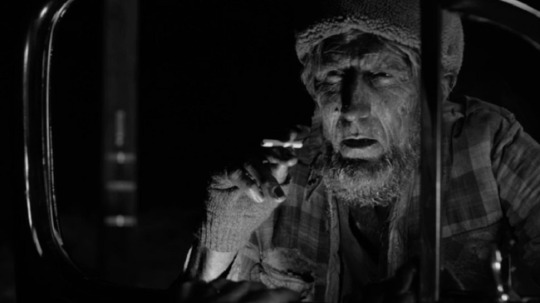
1. Twin Peaks: The Return I was looking forward to this, and I had a pretty open mind as far as what it could be or what to expect from it. But I still had no idea how amazing and immersive and gripping it would all be. I wrote about it over at SportsAlcohol.com and talked about it on the podcast and I STILL only scratched the surface of how I felt about it.
Top Twenty Things I'm Excited About in 2018
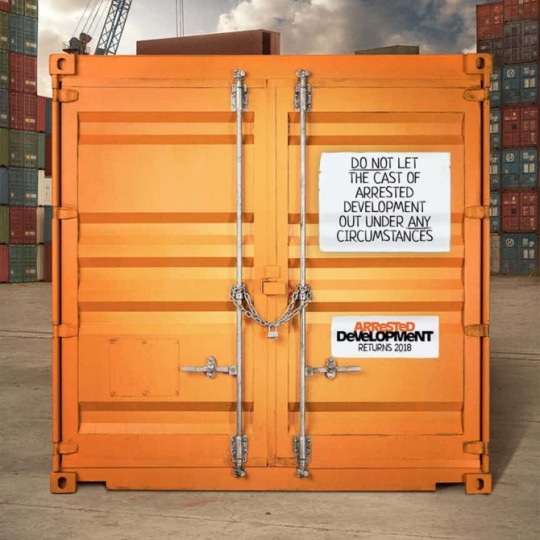
Arrested Development Returns! I adored both the original run of the show and the fourth season that hit Netflix five years ago. I cannot wait for this. The Ballad of Buster Scruggs It's the new Coen brothers project. And it's supposed to be something like six hours of new Coen brothers project. Holy smokes. The Last Best Story I really loved Maggie's last book, and the tidbits I've heard about this one make it sound terrific. Been anticipating this one for nearly three years and it's almost here! Isle of Dogs Wes Anderson movies pretty much automatically quality as "most anticipated" for me, and the trailer for this one looks thoroughly delightful. And it hopefully augurs an exciting year for stop motion animation. While I'm obviously into The Incredibles II and Ralph Wrecks the Internet, I'm even more intrigued with the untitled Laika film scheduled for this year. There's been so little news about it, it seems possible it won't actually hit this year, but even if it doesn't there's Early Man, a new Aardman film directed by Nick Park due out in February, and Jan Svankmajer's final film, Insects, that I hope makes its way to the US this year. Ready Player One I'm sure I'd see this one no matter what, but the fact that Steven Spielberg directed it means I'm actively excited to catch it on day one. Marvel Cinematic Universe After a stellar 2017 (and all the goodwill they built up over the last ten years in general) I'd be excited for their three pictures this year. So the fact that they've got Black Panther (a terrific cast in Ryan Coogler's follow-up to Creed!), Avengers: Infinity War (the beginning of this big two-year culmination event, written & directed by the folks who made my beloved Captain America movies), and Ant-Man and the Wasp (I had a great time with the first one, and Down With Love guarantees Peyton Reed my attention forever), gives me confidence that they'll have another great year in 2018. Star Wars I'm forever excited about Star Wars (or at least the current firehose volume of it still hasn't made me bored of it yet) so I'm pretty interested to see Solo: A Star Wars Story, and I'm also really on the hook to see the final batch of episodes of Star Wars Rebels. Roseanne Revival Maybe I'm just tempting fate because of how the Twin Peaks revival turned out, but I'm excited for this one. I love the original show (one of my favorite little things about getting cable has been that Roseanne is on one channel or another almost all the time) and I'm equally apprehensive about and intrigued by the news that's come out about the revival so far. But I'll definitely be watching the whole thing. Lethal White AND Fantastic Beasts: The Crimes of Grindelwald A new Cormoran Strike book and a new Wizarding World movie with a screenplay by J.K. Rowling! I understand why neither of them are exactly the kind of cultural event that the Potter books and movies were, but I'm personally so excited for both. A Wrinkle in Time AND Mary Poppins Returns Two big Disney productions that are super up my alley, so I'm grouping them together. Wrinkle promises an adaptation of a wonderful book from an exciting director and a fantastic cast. And Poppins has the liability of a director I've been extremely mixed on in the past, but it also has a perfect cast and the original Mary Poppins is a movie a really love deeply. Really excited to have these bookending the year. A New Cloverfield The God Particle was on this list last year, and it's on there again this year. We're only a couple of weeks into the year and it's already been delayed again, so this is in hopes that it does really come out this April. But in any case, with God Particle and Overlord, another mysterious genre film from Bad Robot that fans have been speculating could be another Cloverfield movie, both scheduled for release this year, seems pretty likely we'll at least get one new Cloverfield picture. (UPDATE SINCE I WROTE THIS: the game is afoot again!) Godzilla: Planet of the Monsters It's got a killer premise and it's just hit Netflix! I'm excited for this one, and it seems possible that the second film in the announced trilogy could also hit Netflix before the end of the year. New Darin Morgan X-Files episode The new season of the X-Files revival already seems off to a stronger start than the last one, but no matter what it does hold the promise of another new episode by writer Darin Morgan. This is an event. Disenchantment Look, I still watch (and usually enjoy) The Simpsons. I adore Futurama. I am super excited for a new Matt Groening animated series, and tickled by the notion that it'll explore a new genre. My Favorite Thing is Monsters Vol. 2 The first half of the story was such a beautiful, engrossing, moving surprise this year, that I can't wait for the follow-up. Sense8 Finale Movie I'm glad they're getting a chance to wrap things up the way they want to here, and I'm looking forward to one more visit with this nutty, beautiful show. My Next Guest Needs No Introduction with David Letterman AND Comedians in Cars Getting Coffee I don't keep up with all of Netflix's stand-up comedy offerings or the like, but I am super excited for these talk shows by a couple of my absolute favorite comedy curmudgeons. I actually watched (and really loved) the episode of Letterman's show with President Obama, and I'm looking forward to getting through all the rest of both of these throughout this year. Mute It looks like Duncan Jones's new film, some kind of spiritual follow-up to his great Moon, is finally going to show up on Netflix early this year! And they've also got the next films by Gareth Evans, Jeremy Saulnier, and David Mackenzie that could always drop sometime this year AND The Other Side of the Wind, a lost Orson Welles film! The Predator A new Shane Black movie is a cause for celebration, and while trying to revive the Predator seems like a dicey proposition, he's assembled an exciting cast and co-wrote the film with his Monster Squad collaborator Fred Dekker, so I'm looking forward to seeing what they've cooked up enough to put it here instead of the other genre sequels I'm intrigued by this year (like David Gordon Green's Halloween or J.A. Bayona's Jurassic World: Fallen Kingdom). The Happytime Murders A Roger Rabbit riff with puppets would be enough to get my attention, but get Brian Henson to direct it in his first theatrical feature since his Muppet films from the 90s and I'm fully excited.
0 notes
Text
Why Hollywood As We Know It Is Already Over
By Nick Bilton, Vanity Fair, January 2017
A few months ago, the vision of Hollywood’s economic future came into terrifyingly full and rare clarity. I was standing on the set of a relatively small production, in Burbank, just north of Los Angeles, talking to a screenwriter about how inefficient the film-and-TV business appeared to have become. Before us, after all, stood some 200 members of the crew, who were milling about in various capacities, checking on lighting or setting up tents, but mainly futzing with their smartphones, passing time, or nibbling on snacks from the craft-service tents. When I commented to the screenwriter that such a scene might give a Silicon Valley venture capitalist a stroke on account of the apparent unused labor and excessive cost involved in staging such a production--which itself was statistically uncertain of success--he merely laughed and rolled his eyes. “You have no idea,” he told me.
After a brief pause, he relayed a recent anecdote, from the set of a network show, that was even more terrifying: The production was shooting a scene in the foyer of a law firm, which the lead rushed into from the rain to utter some line that this screenwriter had composed. After an early take, the director yelled “Cut,” and this screenwriter, as is customary, ambled off to the side with the actor to offer a comment on his delivery. As they stood there chatting, the screenwriter noticed that a tiny droplet of rain remained on the actor’s shoulder. Politely, as they spoke, he brushed it off. Then, seemingly out of nowhere, an employee from the production’s wardrobe department rushed over to berate him. “That is not your job,” she scolded. “That is my job.”
The screenwriter was stunned. But he had also worked in Hollywood long enough to understand what she was really saying: quite literally, wiping rain off an actor’s wardrobe was her job--a job that was well paid and protected by a union. And as with the other couple of hundred people on set, only she could perform it.
This raindrop moment, and the countless similar incidents that I’ve observed on sets or heard about from people I’ve met in the industry, may seem harmless and ridiculous enough on its face. But it reinforces an eventuality that seems both increasingly obvious and uncomfortable--one that might occur to you every time you stream Fringe or watch a former ingénue try to re-invent herself as a social-media icon or athleisure-wear founder: Hollywood, as we once knew it, is over.
In the mid-90s, the first time I downloaded an MP3, I realized that the music industry was in grave trouble. People who were my age (I wasn’t old enough to legally drink yet) didn’t want to spend $20 on a whole compact disc when all we coveted was a single song on the album. Moreover, we wanted our music immediately: we preferred to download it (illegally) from Napster or eventually (legally) from iTunes without the hassle of finding the nearest Sam Goody. It turned out that this proclivity for efficiency--customizing your music and facilitating the point of sale--was far from a generational instinct. It explains why the music industry is roughly half the size it was one decade ago.
These preferences weren’t confined to music, either. I also felt the raindrop moment firsthand when I began working at The New York Times, in the early 2000s. Back then, the newspaper’s Web site was treated like a vagrant, banished to a separate building blocks away from the paper’s newsroom on West 43rd Street. Up-and-coming blogs--Gizmodo, Instapundit, and Daily Kos, which were setting the stage for bigger and more advanced entities, such as Business Insider and BuzzFeed--were simultaneously springing up across the country. Yet they were largely ignored by the Times as well as by editors and publishers at other news outlets. More often than not, tech-related advances--including e-readers and free online blogging platforms, such as WordPress and Tumblr--were laughed at as drivel by the entire industry, just as Napster had been years earlier.
Of course, the same logic that had decimated music would undermine print publishing: readers didn’t want to travel to a newsstand to buy a whole newspaper when they were interested only in one story or two. And, in so many cases, they really didn’t care all that much whose byline was at the top of the piece. Subsequently, newspaper advertising revenues fell from $67 billion in 2000 to $19.9 billion in 2014. Meanwhile, the same pummeling occurred in the book-publishing world. Many consumers didn’t want hardcover books for $25 when digital versions were available for $9.99. An algorithm generally provided better suggestions than an actual in-store clerk. And consumers never had to leave home to get the book they wanted. Amazon, knowing this, eviscerated the business. While print sales have finally leveled out (largely through a reliance on science fiction and fantasy), the industry has seen sales fall precipitously over the past decade.
Hollywood, these days, seems remarkably poised for a similar disruption. Its audiences increasingly prefer on-demand content, its labor is costly, and margins are shrinking. Yet when I ask people in Hollywood if they fear such a fate, their response is generally one of defiance. Film executives are smart and nimble, but many also assert that what they do is so specialized that it can’t be compared to the sea changes in other disrupted media. “We’re different,” one producer recently told me. “No one can do what we do.”
That response, it’s worth recalling, is what many editors and record producers once said. And the numbers reinforce the logic. Movie-theater attendance is down to a 19-year low, with revenues hovering slightly above $10 billion--or about what Amazon’s, Facebook’s, or Apple’s stock might move in a single day. DreamWorks Animation was sold to Comcast for a relatively meager $3.8 billion. Paramount was recently valued at about $10 billion, approximately the same price as when Sumner Redstone acquired it, more than 20 years ago, in a bidding war against Barry Diller. Between 2007 and 2011, overall profits for the big-five movie studios--Twentieth Century Fox, Warner Bros., Paramount Pictures, Universal Pictures, and Disney--fell by 40 percent. Studios now account for less than 10 percent of their parent companies’ profits. By 2020, according to some forecasts, that share will fall to around 5 percent. (Disney, partly owing to Star Wars and its other successful franchises, is likely to be a notable outlier.)
Show business, in many ways, has entered a vicious cycle set off by larger economic forces. Some 70 percent of box office comes from abroad, which means that studios must traffic in the sort of blow-’em-up action films and comic-book thrillers that translate easily enough to Mandarin. Or in reboots and sequels that rely on existing intellectual property. But even that formula has dried up. Chinese firms, including Dalian Wanda, are rabidly acquiring companies such as Legendary Entertainment, AMC, and Carmike Cinemas, a smaller theater chain, with an apparent goal of learning how Hollywood does what it does so China can do it better.
But the real threat isn’t China. It’s Silicon Valley. Hollywood, in its over-reliance on franchises, has ceded the vast majority of the more stimulating content to premium networks and over-the-top services such as HBO and Showtime, and, increasingly, digital-native platforms such as Netflix and Amazon. These companies also have access to analytics tools that Hollywood could never fathom, and an allergy to its inefficiency. Few have seen the change as closely as Diller himself, who went from running Paramount and Fox to building his own tech empire, IAC. “I don’t know why anyone would want a movie company today,” Diller said at Vanity Fair’s New Establishment Summit in October. “They don’t make movies; they make hats and whistles.” (Half of the people in the audience, likely representing the tech industry, laughed at this quip; the other half, from Hollywood, cringed.) When I spoke to Mike Moritz, the iconic venture capitalist, backstage at the event, he noted that a nominal investment in a somewhat successful tech company could generate more money than Hollywood’s top-grossing movies. “In my mind,” he said, “Hollywood is dying.”
0 notes